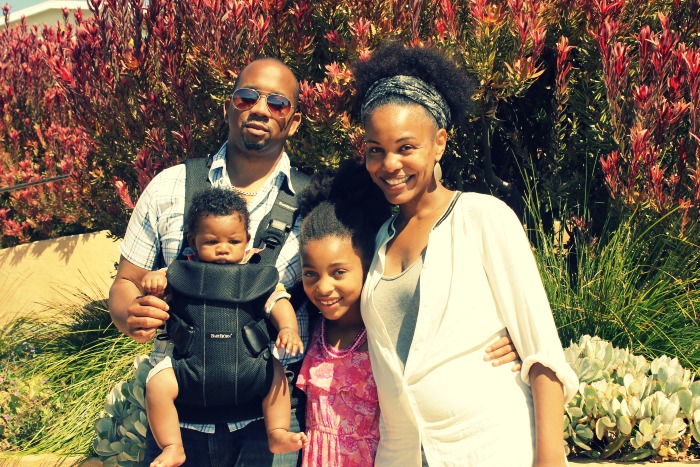Raising a Black child has changed a lot over the years. Here are the ways we’re doing things differently.

When I was younger, I had a lot of criticism about the way my parents raised me.
I thought they were too strict. I didn’t understand why they weren’t more affectionate, and I felt stifled as a child.
Once I became an adult, and even more so when I became a mom, I started to understand their position more.
Black families in the United States were set up to fail from the very beginning.
When children are sold away from their mothers, and men and women are prohibited from marrying, it makes sense that our families would need work.
As times changed, Black folks did the best they could to create family structures that were loving and whole.
Even now, years and years later, in many ways, we’re still learning how to do that.
The most challenging part about the black family experience has been learning to raise black children in an environment that is hostile to them.
On one hand, parents want to be loving and carefree.
On the other hand, we need to be raising our Black children with a heavy hand in order to keep them safe.
We are in the middle of a new revolution. Black folks are rising up and staking claim to the American dream.
We are committed to enjoying the fruits of our labor in this country just as much as any other community, and that starts with our families.
We are raising black boys who are filled with joy, black girls who are carefree, and mothers and fathers are back to loving one another with our entire hearts.
It is revolutionary to be black and happy in this country.
Or black and successful.
Or black and unbothered.
Here are some ways to carry that revolution into your life as you are raising a Black child.

How to raise a Black child with love and intention
1. Ask them questions.
So much of our time as parents is spent talking, teaching, and telling.
Sometimes we just need to listen.
Ask open ended questions and then be ready to sit and hear what your child is saying to you.
There are times when my daughter goes on and on about a subject.
I know that my listening to her now will make sure the door stays open when we need to have to difficult conversations as she gets older.
2. Answer their questions.
I can’t tell you how many times I asked my parents sensitive questions about everything from our family history to pop culture things and they blew me off.
I know that it can be hard to find the right words to answer questions that feel invasive or hard, but it’s super important when it comes to building trust.
3. Demonstrate self-care.
One of the things I remember the most about my parents is that they worked extremely hard.
I rarely saw them take time for themselves to do things like get massages, take a few days for respite, or even take on a hobby. I was in my thirties before I learned how to really relax and care for myself.
To this day I still kind of struggle with it.
I don’t want my children to think that it’s normal to work themselves to the bone and to put their self-care on the backburner.
The world is a very stressful place, and particularly so for black folks.
Self-care is mandatory to be able to survive.
4. Talk about faith and God.
Growing up I was raised as a Christian.
I went to church and Bible study, and nothing else was not an option.
Black folks are so oppressed already that I want my children to be free.
I won’t just take them to church and force them to submit to Christianity.
I talk to them about what it means to be a Christian, read the Bible and explain it to them, and answer tough questions.
As they get older, I pray that they come to know Christ for themselves, but it’s going to be their choice to make.

Raising a black child is a gift
5. Teach them how to invest and save.
Black folks and money have a complicated relationship in this country.
I remember my father talking to me about working and earning a paycheck, but he never really taught me about saving or investing.
We have been in this country working for too long and too hard not to have generations and generations of wealth in our communities.
We have to talk about saving and we have to learn to invest.
6. Share your story with them.
We all have a past, and whether it’s good or bad, we should talk to our children about it.
Just like generational wealth gets passed down, so do family stories.
We have to take the time to share our past with our children so that they know where they come from.
7. Give them choices.
It’s kind of a joke in the Black community that Black kids don’t really have choices.
Mama tells them what they are going to do from birth until the end of time.
That micromanaging stems from really wanting the best for our children, but they have to learn how to make decisions for themselves.
Giving them the chance to decide what to eat, what to wear, or where they want to go is going to set them up for bigger things in the future.
It’s your job to empower your children.
8. Eat good food.
Black people are at a greater risk for heart disease than any other race.
Diabetes and hypertension are also prevalent in our community.
Teaching our children to eat good food is important.
We grew up eating fresh fruit and vegetables, delicious grains, and clean home cooking.
We have to get back to that, y’all.
Making the time to feed our families well is beneficial to our physical and mental health.

9. Spend time outside with them.
Fresh air and vitamin D does the body good.
Back in the day my parents used to send me outside to play by myself. I had a good time, but it would have better if they would have come out with me.
The times my dad did take my sister and me on long bike rides, or shoot some hoops at the playground with me were some of my favorite memories.
Get outside with your kids.
10. Take your children on vacation.
I know that when things are tight (money, time, etc) vacations can seem so frivolous.
They’re so important, though.
The act of being black is so stressful.
Even though I live a pretty leisure life as a work-at-home mom in a liberal (seeming) geographic area, whenever I go away, I realize how much tension I’ve been holding in my body.
I need vacation.
Children need vacation.
Black families have to get away together to relax and recharge.
Vacations help us live longer.

11. Read together.
Most of the black folks I know have children with shelves filled with books.
We have to keep reading to our children, even as they get older.
We are still sending first generations off to college—-literacy is a gift.
Taking the time to connect with our children through books is one of the sweetest ways we can pay homage to our ancestors.
12. Laugh a lot with them.
I love to get silly with my children.
I make a point to laugh as often as possible.
When they look back at their childhood, I want them to remember having fun.
I want them to remember seeing my head thrown back and tears rolling down my cheeks at their silliness.
Other kids get to have fun, our black children deserve the same thing.
this is such a great read cause it’s not just for the family but it also applies to being a leader.thank you so much for this!looking forward for more amazing articles.
I love everything about this.
Beautifully written Brandi! I think many of us should take this to heart and into our family life. So many problems in our world could be solved within the walls of our own homes. We all need to hear these words you wrote and apply them daily. Imagine how much better the lives of so many children would improve if we did. Here’s to a brighter and better future for ALL of our youth!
Great. Teach spiritually Not theology.
My husband and I will be welcoming our first child into the world in August and this list was truly helpful to ready our mind in raising her.
Yay! Congratulations and prayers of great health to you and your family!
Thanks for sharing. It is all so true. Valuable information and a quick read. I will pass it on.